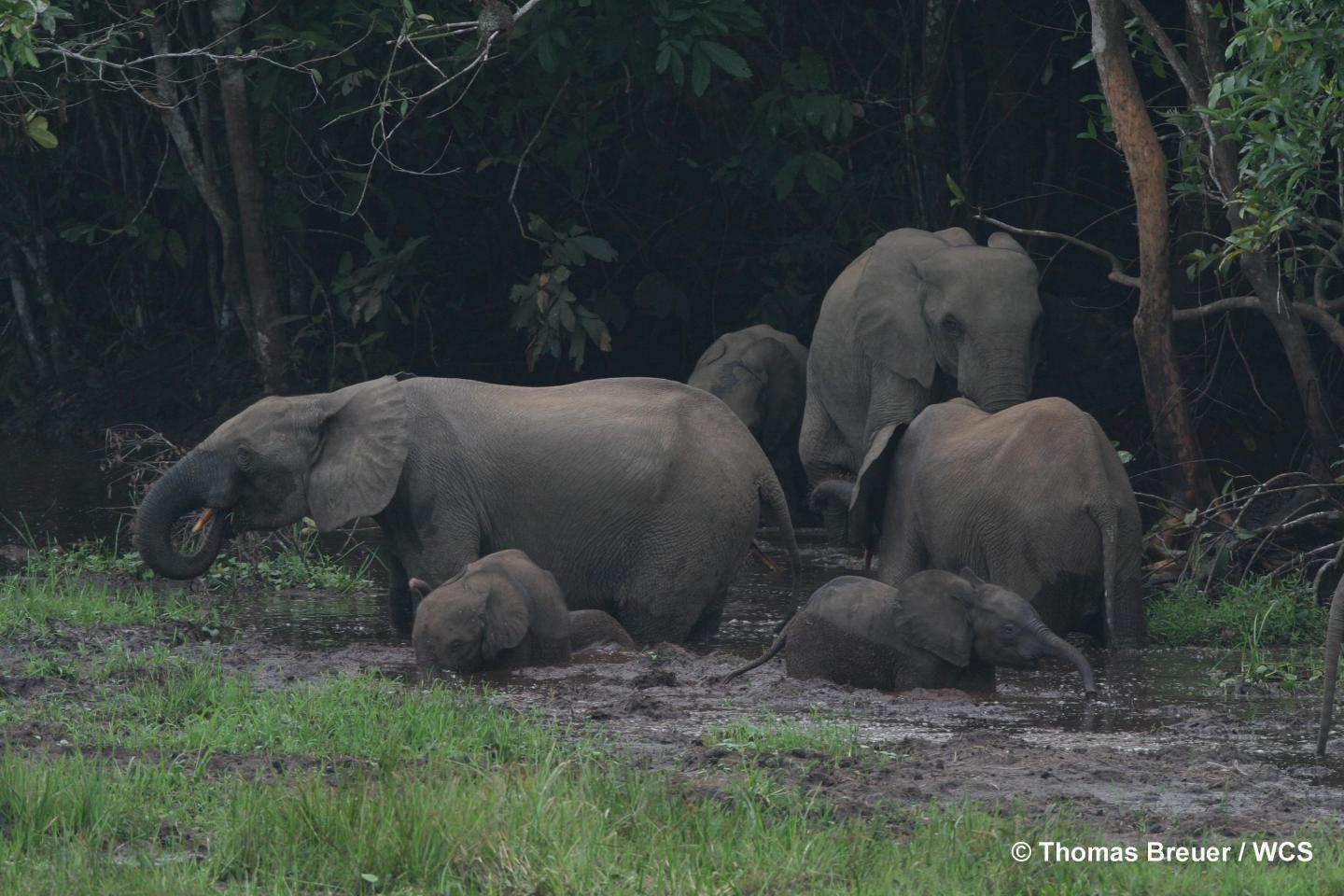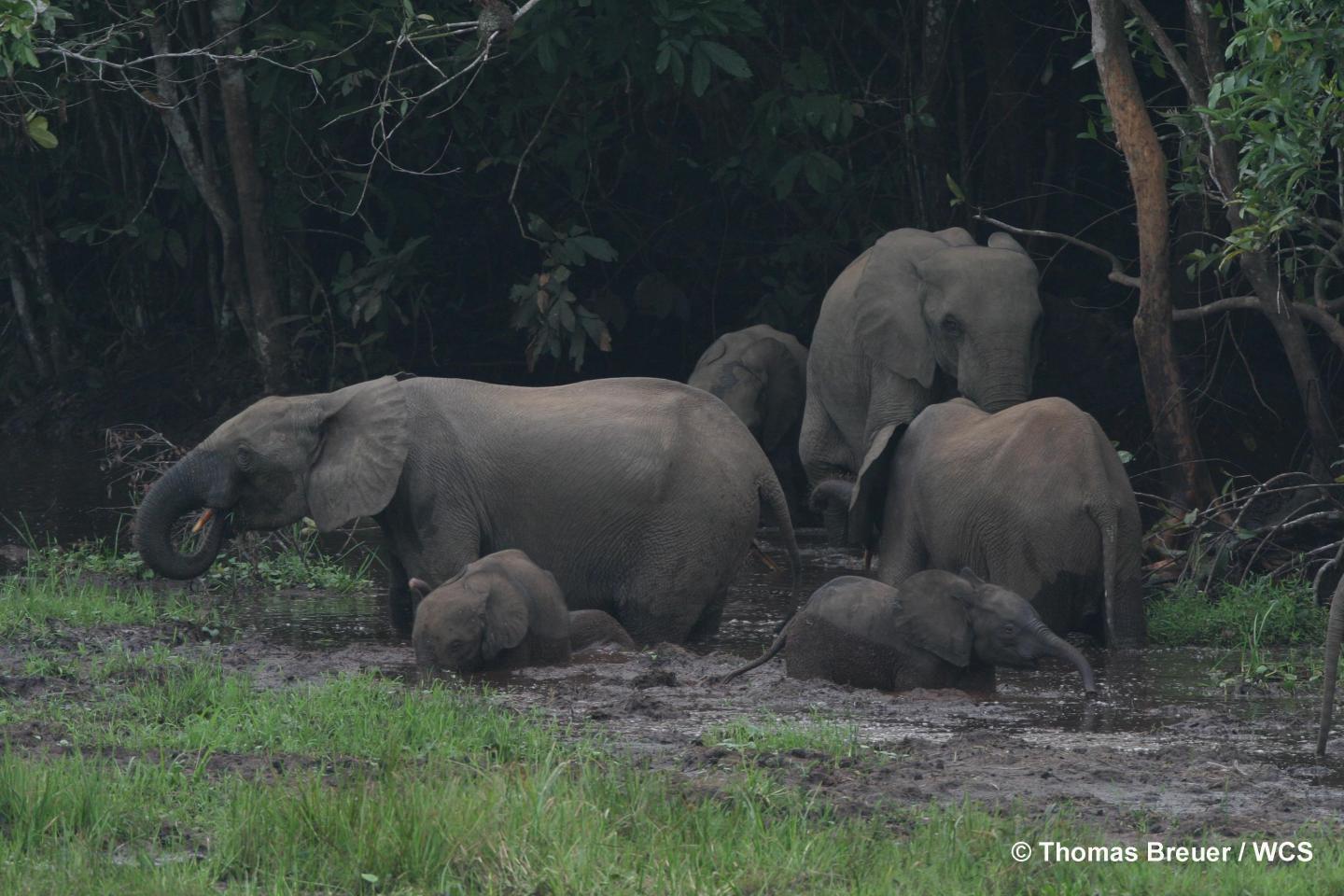
Credit: (c)Thomas Breuer/WCS
Scientists working for the Wildlife Conservation Society, the University of Stirling, and the Amboseli Trust for Elephants say that the high levels of poaching forest elephants will result in a loss of the oldest, wisest matriarchs, who are living libraries of their vast rainforest domain. The oldest females guide and teach their young where to go for food and minerals, what to eat, how to process tricky foods, and how to avoid danger. Without these mothers, forest elephant social lives and their understanding of their ecosystem will be lost. This exacerbates the ongoing loss of ecosystem function already underway by the loss of these most effective seed dispersers and forest gardeners.
Future conservation plans for the lesser known cousin of the African savannah elephant, they say, must include strategies that consider changes to elephant social structure, habitat integrity, and pressure from growing human populations.
The essay titled "Consequences for elephants and forests: poaching and anthropogenic change" appears in the online version of Conservation Biology. The authors are: Thomas Breuer of the Wildlife Conservation Society; Fiona Maisels of the Wildlife Conservation Society and the University of Stirling; and Vicki Fishlock of the Amboseli Trust for Elephants and the University of Stirling.
"We've been aware of the catastrophic decline of forest elephants since 2013" said WCS Conservationist Dr. Thomas Breuer, lead author of the essay. "But, as with savannah elephants, the impacts are greatest when we lose the matriarchs."
Scientists conducting long-term studies on savannah elephants have documented numerous and long-lasting effects of poaching and other forms of anthropogenic disruption on behavior. For instance, savannah elephants exposed to poaching become more nocturnal and more skittish outside of protected areas, which in turn can become more crowded with elephants and may be impacted by increased grazing and browsing.
The loss of older individual animals, both male and female, affects the ability of populations to remain socially stable and robs other elephants of the survival skills of the most experienced members. Elephant matriarchs guide their families to key resources – water in savannahs or scarce fruiting trees in rainforests – and hold decades of geographical and social knowledge.
Breuer and his co-authors say that forest elephants are probably experiencing–and causing–the same behavioral and ecological changes in their ecosystems as savannah elephants. Forest elephants play a crucial role in the seed dispersal of many plant and tree species, the maintenance of trail systems and natural forest clearings, and the distribution and renewal of soil nutrients across enormous areas. Their role as ecosystem engineers maintains the habitats on which many other plant and animal species depend.
"We should assume that these disruptions of forest elephant society and rainforest ecology are occurring, and that these assumptions need incorporation into conservation planning," said Dr. Vicki Fishlock.
Maintaining forest ecosystem functionality requires anti-poaching and anti-trafficking strategies to halt the killing and allowing surviving elephant populations to recover. Lessons from elephant losses in Western Africa should be used to support human-elephant coexistence around refuges, until elephants feel safe enough to recolonize their former range.
Protecting complex forest elephant sociality and experience prevents downstream disturbance for elephants and their habitats and requires systematic assessment of the effectiveness of protected area networks–including connectivity between sites. Finally, the authors emphasize the need to better understand the impact of poaching on the life history and social organization of forest elephants.
###
Wildlife Conservation Society (WCS) saves wildlife and wild places worldwide through science, conservation action, education, and inspiring people to value nature. To achieve our mission, WCS, based at the Bronx Zoo, harnesses the power of its Global Conservation Program in nearly 60 nations and in all the world's oceans and its five wildlife parks in New York City, visited by 4 million people annually. WCS combines its expertise in the field, zoos, and aquarium to achieve its conservation mission. Visit: newsroom.wcs.org Follow: @WCSNewsroom. For more information: 347-840-1242.
96 Elephants
WCS is leading global efforts to save Africa's elephants and end the current poaching and ivory trafficking crisis. In September 2013, WCS launched its 96 Elephants campaign to amplify and support the Clinton Global Initiative (CGI) "Partnership to Save Africa's Elephants" by stopping the killing, stopping the trafficking, and stopping the demand. The WCS campaign focuses on: securing effective moratoria on sales of ivory; bolstering elephant protection; and educating the public about the link between ivory consumption and the elephant poaching crisis. http://www.96elephants.org
Media Contact
John Delaney
[email protected]
718-220-3275
@TheWCS
http://www.wcs.org





